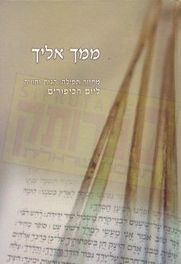 When I was in Israel on Nativ, I was introduced to an amazing Machzor which has forever altered my High Holiday experience. Named ממך אליך (Mimcha Eilecha - 'From You, To You'), it's concept is brilliant - to provide a complete, traditional text surrounded by a plethora of traditional and modern commentaries, with everything from traditional, medieval and hassidic texts to modern poetry and short stories. Although it sounds like a lofty goal, I would love to see if anyone would publish a similar set in Emglish: a complete traditional Hebrew text, a translation that is faithful to the original, and texts to complement it from every corner of the Jewish experience, spanning time, place and outlook. While I do find the traditional liturgy and especially the piyutim (poems which complement the structured prayers) very meaningful, the readings and quotes in this Machzor have helped to enhance the meaning of my Rosh Hashanah and Yom Kippur experience.
When I was in Israel on Nativ, I was introduced to an amazing Machzor which has forever altered my High Holiday experience. Named ממך אליך (Mimcha Eilecha - 'From You, To You'), it's concept is brilliant - to provide a complete, traditional text surrounded by a plethora of traditional and modern commentaries, with everything from traditional, medieval and hassidic texts to modern poetry and short stories. Although it sounds like a lofty goal, I would love to see if anyone would publish a similar set in Emglish: a complete traditional Hebrew text, a translation that is faithful to the original, and texts to complement it from every corner of the Jewish experience, spanning time, place and outlook. While I do find the traditional liturgy and especially the piyutim (poems which complement the structured prayers) very meaningful, the readings and quotes in this Machzor have helped to enhance the meaning of my Rosh Hashanah and Yom Kippur experience.On the final page of the Yom Kippur Musaf service I found a short bt very meaningful quote which hearkens back to my d'var torah for Shabbat Shuvah:
קחו עמכם דברים ושובו אל ה' -את הדברים שאתם אומרים בבית הכנסת, בשעת התפילה והלימוד, אל תשאירו שם, אלא קחו את הדברים הללו עמכם גם בצאתכם משם.
"Take with you words (d'varim), and return to God" - These words which you say in the synagogue, during times of prayer and study, should not be left there, but rather should be taken with you when you leave there."
- Malbim (19th century Russia)
I feel that this quote is the perfect answer to my search. There is a reason the Yom Kippur happens once per year, as it is the pinnacle of our relationship with God. But this day was and is not an end in and of itself, but a means to impact on how we choose to live our lives each and every day. Especially on Yom Kippur, but each and every time we daven or learn, we should not leave our words and prayers in Shul, but allow them to influence our daily lives. Judaism is not meant to be just a compartment of our lives, but the essence of who we are and what we believe in.
No comments:
Post a Comment